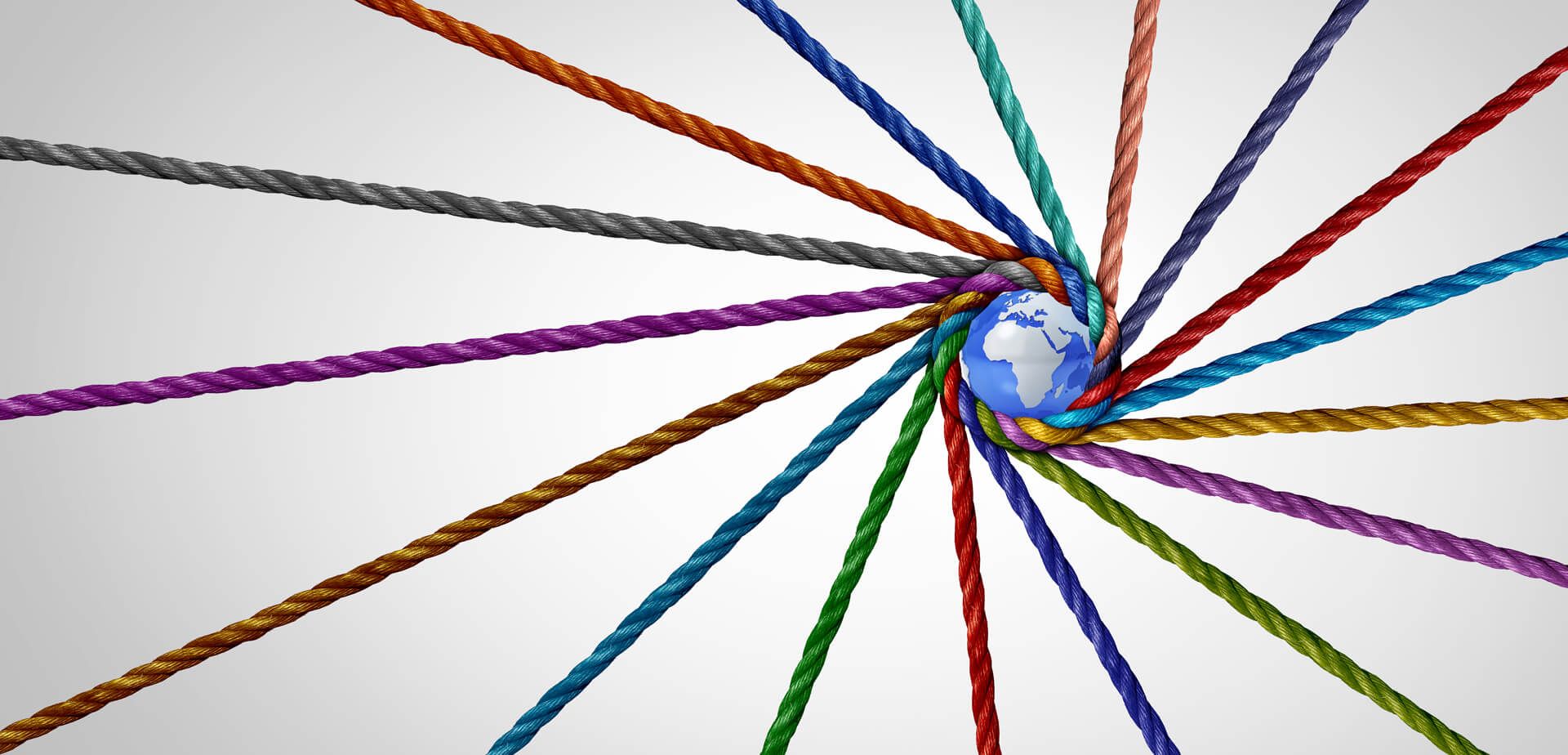
Thornburg’s Matt Burdett feels the weakness in European stocks provides a decent backdrop for finding good ideas and global leaders at good prices.
Is this the Right Time to Invest in Europe Yes says Matt Burdett
Matt Burdett: You always want to find good companies that good prices. And, you know, there are a lot of them in in Europe. Europe has a lot of companies that are domiciled in Europe but are multinational in terms of their actual operations. And when you have selloffs like this, you can often find companies that are very global in nature but are at discounted prices.
Craig Blessing: Hi and welcome to another episode of Away from the Noise Thornburg Investment Management’s podcast on key investment topics, economics and market developments of the day. I’m Craig Blessing, Client Portfolio Manager for International Equity at Thornburg and I’ll be your host. Joining us today is Matt Burdett, managing director and Portfolio Manager for International Equity and Global Income Strategies at Thornburg.
Matt, International equity markets are down about 13% year to date. Europe, which makes up about a third of those markets, is down a bit more at 13 and a half percent but has certainly been on investors radar screens given its proximity to the conflict in Ukraine, all of the press and the resulting cross currents. Given its importance to international investors, what do you think would be the three most important questions for investors or potential investors in Europe right now?
Matt Burdett: Yeah, thanks Craig. It’s a good question or series of questions. Look, I think a lot of the underperformance actually in Europe is from the currency. The euro has depreciated quite a bit versus the dollar. So, in local terms, European equities have actually held up better than people probably think here in the U.S.
Yes, Greater Europe is obviously closer to the center of the conflict in Ukraine. You know, I think the initial reaction from investors was to get out of Europe as quickly as you can because the conflict is going to spread. That’s how I would characterize the initial reaction. And I think what we’re seeing is that the conflict has, at least to this point, been mostly contained to that region. But there are obviously broad implications as a result of it.
The most important implication from an investment standpoint is the fact that this crisis has elevated an energy crisis that was already underway before this conflict broke out. As a result, you have extremely high natural gas prices and oil prices. But the natural gas price in Europe feeds through other parts of the economy. It feeds through the price that people pay and companies pay for electricity because much of the power price is determined based on what the gas price i. So when the gas price goes up, the power price goes up. So consequences of that are obviously consumers will be paying more for their energy bill than they would otherwise before the conflict. Businesses, certain businesses, which are very energy intensive, you can think of cement and steel that uses a lot of power are going to be less competitive than they would have been otherwise before the crisis.
So, there is a material impact on consumers and the industrial sector as a result of this. Now, in the gas price, the natural gas price, there’s a fair amount of geopolitical risk premium in the sense that there’s a fear Russia will turn off the taps of natural gas into Europe. And where we’ve all read about Russia threatening to cut those flows off under various conditions, it has cut flows off from certain countries.
But by and large, the core of Europe, you know, the main countries Germany, Italy are still getting the natural gas and recent developments have kind of lessened the risk premium in a sense because there was a request by the Russian Federation that European countries pay for the gas in rubles, and that would have been against the EU sanctions.
Well, if you fast forward to where we are today, there are mechanisms in place now whereby European countries can pay in euro, and then it gets converted to rubles through a Russian entity. Sanctions are not violated and the Russian Federation gets what it had asked for. So in a way, cooler heads have prevailed with respect to getting gas into Europe.
I think what happened with many investments was it was you know, like I said, the initial reaction was to sell everything because the entire continent was going to be invaded. That’s not really what’s happened. And if you can pull a positive out of it, I mean, obviously, the loss of life is a terrible thing. But this is also a big wake up call, I think, to the European continent and its leaders that they need more investment to be self-sufficient. So if I can say there are three big things out of all this will be, one, more independence from an energy perspective.
And to have that, that means you need to have investments. There are material investments around renewables and other infrastructure, primarily to take care of alternate gas sources like LNG from the U.S. and just efficiency measures, which will be good for investment in the continent overall. And probably surprising to many people is, you know, we’ve pretty much wrapped up the first quarter of earnings.
And European companies have actually beat earnings estimates more than U.S. companies have. I think the number is 10% for Europe versus 5% for the U.S. So it’s actually been more robust than most people think.
Craig Blessing: So, before the crisis, Europe had one of the most ambitious energy transition plans in the world. How, if in any way, has the crisis impacted that?
Matt Burdett: Yeah, it’s very complicated. I think the ambitions of energy transition were centered on reducing emissions, which I think the Europeans wanted to take a lead globally in getting emissions down by moving to greener technologies, by having all member states be aligned with that goal. You know, the reality is and I mentioned this a bit earlier around, you know, the energy crunch started before the invasion happened.
And that energy crunch was really the result of the lack of investment in traditional oil and gas. And for many reasons, oil and gas companies were not really being rewarded for making those investments. And in many cases, for many stakeholders, they were told to not make those investments right as a result of the emissions that they produce. And the reality is the world just wasn’t ready for that level of green transition.
Now, what the conflict does is it makes that transition that much more important because the continent is still very dependent on Russian gas. It’s roughly 40% of gas into Europe. And it really heightens the view for not only policymakers, but of the average person, right. That we need to transition quicker and be more self-reliant so that we’re not in this position anymore.
So, if anything, what this has done is it’s heightened the degree to which they need to act, which means invest now along the way, there’s a lot of political noise around trying to contain power prices and energy prices. It quite frankly, is just going to take time to work through. But I think at the end of the day, it makes energy transition that much more important for Europe, given the dependency position it was starting in on Russian gas.
There are good near medium- and long-term investments because there was meaningful pressure on traditional oil and gas companies to basically not produce oil and gas because it was carbon emitting and basically they were evil.
But now you fast forward to today and look where we are. Your short oil and gas period. And you can’t just create it overnight. You have to, like, spend the money. You got to go find out where you’re going to get it from. You’ve got to build the infrastructure. It takes a while to do that. And I think the energy transition is going to be multiyear and it’s going to be it’s going to happen in like building blocks.
You’re definitely going to have more renewables, more solar, more wind. You’ll start seeing more offshore wind, which is actually where most of the available real estate is for wind. The speeds tend to be higher. So it’s a little higher load factor, meaning the capacity utilization is higher but you’re still going to need some type of transition energy off of traditional source.
And it’s most likely still going to be gas. There are more investments being made to receive LNG. And LNG can come from the U.S. or from the Middle East. There’s investments happening that will, you know, where you’ll find companies that are that are doing both. There’s some very interesting investments that are involved in both ends of that and the runway for this transition is very long. It’s not going to happen in two, three, five years. We’re talking ten, 20 years. That’s pretty powerful if you’re well-placed as a company, to me it seems like that’s a pretty decent backdrop for investments.
Craig Blessing: So a big focus in U.S. markets has been inflation, interest rates and monetary policy, and that’s driven markets and market valuations. But from a U.S. perspective, we hear a little bit less about inflation and interest rates in Europe, which have also been on the rise. Where are we in the inflation and monetary cycle in Europe, and what does that mean for markets?
Matt Burdett: I think it’s probably a critical question with respect to how different sectors will perform. Look, the U.S. still has an inflation problem, as does Europe. I think the big difference in Europe is that roughly two thirds of the inflation contribution, you know, to the year over year increase comes from energy. OK, so so whereas in the U.S., it’s it’s energy is a contributor, but that’s not the main driver So I would say Europe inflation is a bit more cyclical with respect to to the energy component.
One could look back and say, well, the ECB is probably much further behind the curve than the Fed because the ECB still has a -50-basis points deposit rate as its policy rate. That is completely not congruent with where inflation is, which is somewhere around around 7% roughly. Now because of the of where we are in this, and just the way the comparisons will work year over year, the numbers should come down just like it will in the U.S. But it’s still going to be a much higher number, well above the target inflation that the ECB has. At this point, there’s really no need to have a -50 basis point deposit rate. It’s just not necessary. So I think the ECB has communicated and normalization of policy likely hiking in July and a couple more hikes you know in the coming months and quarters and maybe more – depends on where inflation is. The implications of that are one interest net interest income for banks let’s say is going to be a much better earnings provider than it’s been. Right? Because this repressive central bank policy has been going on for years. And so you’ve you know, if you were to look at these banks, you’d see net interest income getting compressed simply because you had a -50 basis point deposit rate and yields were then pulled down as a result of that. So the normalization that needs to happen is ultimately a good thing.
It’s a good thing for obviously financials, because as rates rise, that helps them earn more interest income. But it’s also good just from a capital allocation standpoint where capital can be more effectively priced by the market when you don’t have rates as manipulated as they have been with you know, negative interest rate policy.
Craig Blessing: In recent weeks, interest rates have actually been going down in the U.S., given people thinking about the increased possibility of a recession over the next four to 18 months. With all the crosscurrents in Europe, what’s the possibility of a recession there?
Matt Burdett: There’s probably a decent sized camp that sees Europe being in a recession, you know, by the end of the year with a fairly high probability. It’s more complicated than that simply because the European economy is a little more export dependent than the U.S. economy is. I wouldn’t put a high probability of recession in Europe at this point. I think balance sheets are still very strong, but there are some challenges for sure.
Growth is obviously slowing everywhere for different reasons. I wouldn’t say it’s a foregone conclusion that Europe is going to be into a recession, slower growth for sure. I think Europe will probably be more impacted by the lockdowns in China than let’s say the U.S. would just simply because it’s heavily exports to China. And that might impact them a little bit more on the margin.
But overall, you know, when you take everything together, it feels like prices kind of reflect recession risks in Europe anyway. And so if it’s priced in, then you’re not paying for good news at these prices anyway.
Craig Blessing: So given all of that uncertainty and lack of visibility out there in markets right now, what types of things are you finding attractive now, and how might that be different from what types of things you would find attractive if visibility increased?
Matt Burdett: You always want to find good companies that good prices. And, you know, there are a lot of them in in Europe. Europe has a lot of companies that are domiciled in Europe but are multinational in terms of their actual operations. And when you have selloffs like this, you can often find companies that are very global in nature but are at discounted prices.
You know, I think I think resiliency in earnings is something everyone would be looking for at this point where we are in the market and the economy, given all the uncertainty. And probably you’re likely to have higher commodity prices, at least higher than you would have had before the invasion, you know, for some time.
And when you think about the energy transition, it really isn’t just about renewables. It’s more about both its more about traditional oil and gas, as well as having assets that are part of the green transition, because it really is going to be a multi, multi-year transition. So there are there’s some some companies out there that are priced still very, very cheaply relative to what seems to be like, fairly durable earnings and cash flow.More importantly, over in the near and medium term, that would be attractive to us.
Craig Blessing: So is Europe really more unified? There appears to have been a lot more unity within Europe, certainly around defense issues, obviously, given the conflict. But do you think that that unity could carry through after the crisis to economic or other political issues?
Matt Burdett: Yeah, it’s I mean, it’s a good question. And the answer is we’ll see. We don’t we don’t actually know. You know, moods can change. But let’s let’s think about it this way. You know, there have been several big events for Europe over really over the last 12 years or so. You know, it started off, you know, as we came out of the global financial crisis, Europe then entered into a sovereign crisis where, you know, sovereign yields were were multiples of what they are today, basically because you had northern Europeans telling southern Europeans they spent too much money and they needed to get their their act together. Right? And spend less. And it became frugality and not spending. And that was a tough time that took years to kind of work through. Right? And then, you know, you fast forward then you had the trade wars begin when Donald Trump was the president of the US and took a very strong stance, you know, against against China. But even, you know, tried to take a stance against Europe.
And I think Europe found itself in the middle of this, caught in the middle of this. And then came the pandemic. And the pandemic came and Europe, like the U.S., realized that it was not as self-sufficient as it should be. Right. And this was just the globalization that had happened over decades. And then this realization point in a pandemic where it highlighted, you know, you didn’t have critical supplies that you needed at a time when you needed them.
And now you have the invasion. And I should back up here even in the pandemic. What changed in the pandemic was you had unification around fiscal policy, and that is that was something that was different for the first time. And they had the EU recovery fund, which I think most people are familiar with, which is a large investment program that’s allocated in different portions to different Eurozone countries to build on long duration investments like the green energy transition, more digital infrastructure, things of that nature that have long payoff periods.
And what was interesting about it was there was no bickering about who was going to get what and who was going to pay for it. It is very unified so it was a very a very different change in attitude about how Europe should move forward, you know, as an economic bloc. And then you fast forward to the invasion today.
And then the other way, you know, that’s kind of the last wakeup call where, you know, their defenses were just not as robust as they would like them to be. And they realized that the world has had some bad actors and they happened to be closer to them than they are to the people in the US.
So sometimes you learn lessons the hard way, but those are usually the lessons you remember best. And I would say that’s kind of you know, if I take all of those events that have happened and it’s really, I think at this point shown that they’re much stronger as a unit, as a unified front than they would be, you know, trying to bicker with one another about what’s simply best for an individual country. So in that sense, you know, we’ll see how it plays out. But again, the series of events that have happened have really, I think, changed the way Europe as a whole is going to act.
Craig Blessing: So, let’s finish with the most repeated question from investors in a number of markets right now. Is Europe investable and if so, when?
Matt Burdett: Look, I think it’s investable right now. Like I mentioned earlier, there are a lot of global companies there who do business in countries all over the world. Some of these companies actually do more business outside of Europe than they do in Europe. They just happen to be domiciled in Europe. And I think if you take a step back and you think about all the events that have happened and what they mean for investment need in Europe, that sets up a pretty decent backdrop for finding ideas and finding good companies at good prices that have decent runways for growth for important reasons.
The valuation discount versus the U.S. is about depending what multiple you want to look at, it’s 30 to 40% cheaper. So that’s you know, you’re getting a discount a discounted price today. And you know that’s kind of for me that’s a good starting point to look for investments.
Craig Blessing: Thanks, Matt and thank you for listening. You can find us on Thornburg dot com slash insights as well as on Apple Podcasts where you can rate subscribe and review us. Please join us again soon for the next episode of Away from the Noise. And thanks again.
Discover more about:
More Insights

Thornburg Investment Income Builder Fund – 1st Quarter Update 2025

Taiwan Semi, Tencent, and Other “Quality” Favorites

Investor Spotlight: The Municipal Bond Tax Exemption

Thornburg’s History of Recognition

International Equity: The Power of Global Diversification


